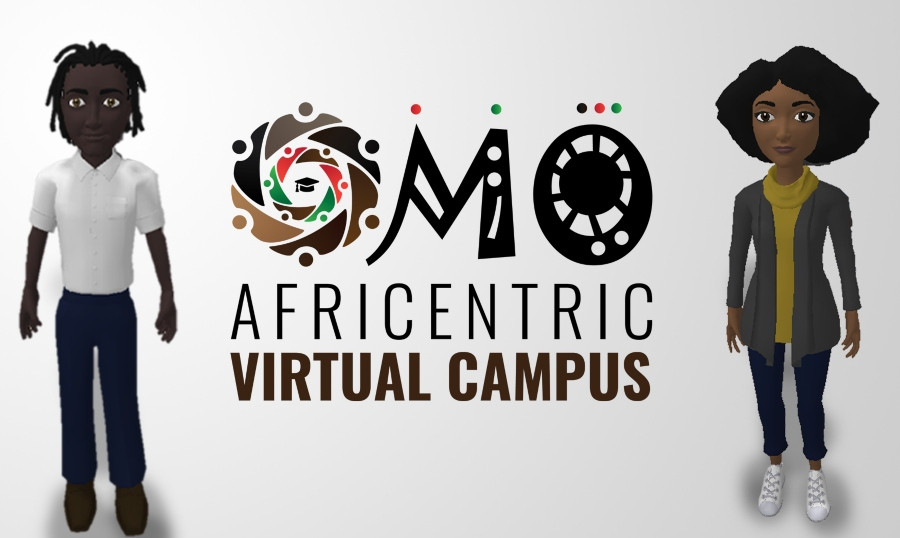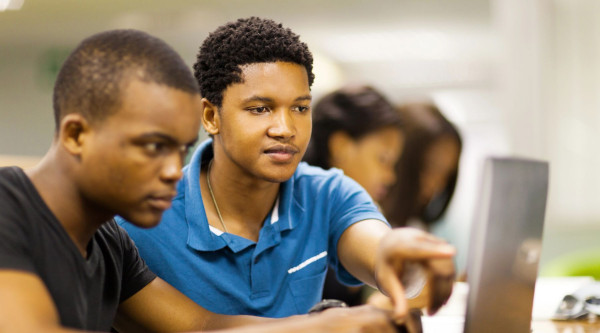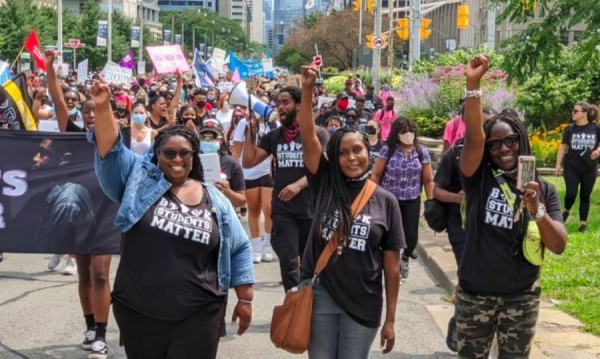The Omo Africentric Virtual Campus - also known as the ‘O’ - is an online virtual campus for Black students in grades K-12. Students can create their own personalized avatars and access free virtual drop-in tutoring, educational tools, and other culturally relevant resources from an Africentric lens. It's like Roblox, but with an educational focus.
The campus aims to:
⦁ Mitigate potential learning gaps resulting from interrupted schooling during the pandemic;
⦁ Empower students with confidence as they head into a new academic year;
⦁ Provide parents/guardians with support and knowledge on navigating the Ontario education system and its processes;
⦁ Reduce feelings of isolation for Black students;
⦁ Re-engage Black students who have been disengaged from traditional education - particularly during the pandemic.
The PoBC has been engaged in efforts to make navigation of the school system easier for Black students and parents. The PoBC was inspired to create this space to help children receive information without the feelings of self-isolation that are common in the traditional school system.
“We at PoBC serve the Black community and feel that it is important to have a space where Black children feel safe," says Kearie Daniel, one of the co-founders of PoBC and the campus architect. She adds, “It's a different way for children to be educated. This was an opportunity to launch Africentric programs where kids could get everything in one location, could connect and more importantly, feel safe to learn and explore their culture.”
Although PoBC is primarily operating in Ontario, it has been serving Black children and parents regardless of their location.
“Most of our members are from Ontario but we never turn away children from other places in Canada. That's what we're here for,” reassures Daniel.
The campus is funded through the Federal Safe Return to School, a short-term grant administered through the Ontario Ministry of Education. The funding is to provide tutoring services from September 2021 through April 2022.
{https://www.youtube.com/watch?v=bU9o3N774w4&t=45s}
Campus Features
The virtual campus will provide free tutoring in English and French in its virtual tutoring centre. A live tutor will provide real-time assistance with homework to children. Four tutors will be available every week. Access will be granted on a first-come, first-serve basis, with a capacity to serve 36 students each day. However, the campus is ready to manage more students based on demand and numbers.
“We can accommodate more students and are working with other universities to expand our programs,” explains Daniel.
Parents will book a 20-minute time slot. Bookings can be made one day before the online session. Parents are advised to email their child's homework to the campus in advance so that tutors can review the content and make sure they have the appropriate materials with them if needed.
The tutor-to-student ratio is 1:1 unless students from the same grade level join sessions as a group for assistance with the same homework. Students can interact directly with their tutor through audio or chat, upload assignments to a shared screen, and get their questions answered in real-time.
The whiteboards and screens are very flexible. For example, students can share their homework on the screen, the tutor can then guide the student and do some lessons with them. The sessions are downloadable. Once the tutoring lesson is over, the campus can email the content that was provided over the whiteboard for parents to use as a reference.
The rooms where the tutoring takes place can be 'locked' for a private education session, allowing the participants to chat and share their homework in private. Students in this space will be isolated from any noise and disturbances made by others.
The tutoring service is provided on Mondays, Tuesdays, and Thursdays after-school hours (4 p.m. to 7 p.m.). The PoBC conducts a web-based version of the campus on Wednesdays.
Students will have to download the tool if they are using a PC or Mac. Chromebook users can simply enter the web address to get access on Wednesday.
At the time of writing, over 200 parents have registered their kids at the campus and momentum is picking up. “This is a slow process, primarily because most kids don't have much homework due to the pandemic,” says Daniel. “But we're getting them to join the campus and download our content. My son also was in here and loved it so much that he wants to come back. I think that's always a good sign.”
Other campus features worth mentioning include:
⦁ A social justice resource space named after the late community activist, Kola Iluyomade.
⦁ The ‘Marcus Garvey Tower of Heroes’, a specially curated virtual space dedicated to educating young people on the contributions and accomplishments of African-Canadian trailblazers that are not covered in traditional schools.
⦁ Four Interactive library rooms split by grade level, with a special selection of books centred around Black authors, characters, and experiences.
⦁ STEM (Science, Technology, Engineering and Mathematics) space
⦁ Conference rooms and exhibition halls for sponsorship opportunities.
⦁ Various uplifting features such as the hair care room with resources for hair care, and a historical overview of Black hair.
Other amenities include:
⦁ Community meeting room
⦁ Parenting room (with resources for parents)
⦁ Dance room
⦁ Soccer field
⦁ Theatre space
“The whole campus is a learning opportunity for various academic subjects and not just Black history,” says Daniel. She continues, “If you take the STEM room, for example, it provides children with an opportunity to learn science and hear about careers they may not have considered in school.”
PoBC plans to offer mental health support and Africentric programs at the campus to students and parents. PoBC is also looking for opportunities to partner with other organizations, “There are so many opportunities that await us. But right now, the focus is getting students into the campus and getting them used to the virtual space,” states Daniel.
The Omo Campus is an agile space in a changing environment. The content will be continually updated based on feedback and trends.
“We continue to make new changes and test various content. Our goal will be to shift at least once a month. In the libraries, we want to make sure there are new books that children can discover. It's a fun thing for them to check out,” says Daniel.
She added that families and students can email PoBC if they want to provide feedback so that the campus can be tailored to their needs. PoBC will provide an evaluation once it has had a chance to get the initiative off the ground.
PoBC is now getting the information out to schools and inviting as many students into the campus as it can for drop-in tutoring.
In terms of human resources, the campus has one part-time employee who manages its day-to-day affairs and four tutors. The rest of the operation is run by volunteers.
PoBC is grateful to the Ministry of Education and the federal government for the funding and support. Community and private sponsorships are being sought to ensure the platform can run smoothly. The advocacy group also welcomes volunteer teachers who are interested in providing tutoring services so it can support more students. Designers who are interested in providing educational graphic designing services are also welcome.
“This is the first of its kind virtual space in Canada for Black students. We want to make sure that it's here for a long time,” says Daniel, who stresses the importance of sustainability and long-term viability. She admits that acquiring funds for the campus is challenging. “Money is always an issue for grassroots organizations. For a program like ours to thrive, we'll need access to sustainable funding instead of short-term funding,” she says.
Meanwhile, PoBC is thinking of ways for generating revenues to keep the campus running. “There are opportunities for this. We can provide a convenient virtual meeting spot for organizations. They can lease space so that their staff can have their own office, auditorium, and an expo hall,” Daniel states.
Daniel would like to thank the designers and everyone who worked on the project. “Everyone has put a lot of hours into this project. Often, they did more than what they were paid to do. This is a labour of love for sure,” she says.
The Omo Campus never shuts down and is designed for easy navigation. Students can come in, explore, learn, and play any time.
“This is a great opportunity to get homework help for children from expert tutors who look and sound like them in a fun and interactive environment,” Daniel states. “If you enjoy games or if you enjoy learning virtually, this is the space for you.”
To register with Omo Campus, visit www.parentsofblackchildren.org/campus.

 By
By 





